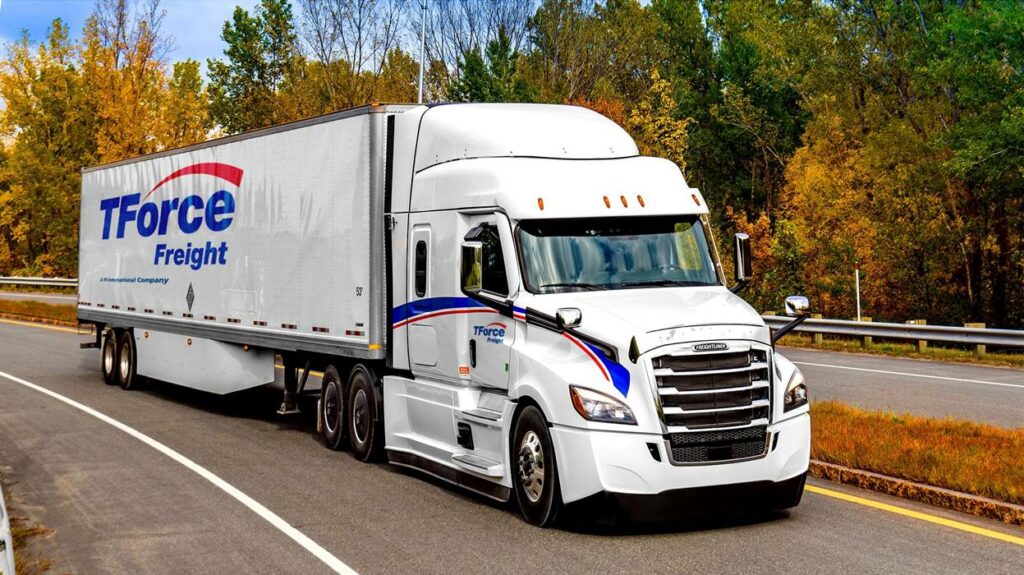TFI focusing on ‘freight that fits’ former UPS Freight biz
TFI International says its recently acquired UPS Freight business is already outperforming expectations, but work is still needed to ensure the now-named TForce Freight delivers consistent and profitable results.
That means focusing on “freight that fits” the less-than-truckload operation.

“We can’t haul a shipment with revenue of less than $100,” chairman, president and CEO Alain Bedard told industry analysts on a call this week. But about 1,500 shipments per day are moved for less than that amount.
“You lose your shirt on that,” he said.
For smaller loads, this might mean shifting work to UPS Ground with Freight Pricing, which is also being tested as an option in the Canadian market.
“They’re going to save money, we will make our margin on it, and UPS will make its money on it as well,” Bedard said, adding that TFI’s final mile divisions could offer another solution.
‘A lot of garbage’
So, too, is the fleet addressing accessorial charges and other unprofitable contracts.
About four major accounts have already been addressed, correcting issues such as waived tailgate charges. And the largest account, which had run with an operating ratio of 1.20, is under a new deal as of July 1, Bedard said. “What we got from this acquisition is a lot of garbage in terms of contracts.”
The deal for UPS Freight closed as recently as April 30.
While TForce Freight reported a 0.90 operating ratio in the most recent quarter, that also tends to represent the operation’s strongest period of the year. The goal is to ensure the all-important measure of operating expenses against net sales dips below 0.90 every month.
In Canada, TFI International’s LTL business reported an operating ratio of 0.78, and the results tend to be consistent from one quarter to the next.
“We know there is some cyclicality at TForce Freight that we’re going to be working on,” Bedard said.
“This will take us probably more than a year to correct all the issues we have with the freight that does not fit.”
But it also took about 11 months to improve the profitability of business acquired from CFI, he added.
Beyond revenue
The focus on profits extends beyond revenue alone.
The fleet will be dropping top speeds from 68 mph (109 km/h) to 65 mph (105 km/h) in the name of safety and fuel economy. Investments are also planned in the equipment and facilities alike.
“We’re going to spend a lot of capital there,” Bedard said, noting that a renewed fleet will reduce maintenance costs and improve fuel economy. Granted, some of the trucks ordered for 2021 are now arriving in 2022 because of supply constraints.
While TFI International shut down 30 fueling stations included with the UPS Freight purchase, that was designed more to reduce environmental risks and control leakage than it was to control fuel costs.
Cargo claims, currently accounting for about 1% of revenue, should be closer to 0.25%, Bedard added, noting that close to $350,000 per month is lost because of spills. That will see a greater focus on issues such as the way trailers are loaded.
The business will also shift away from cash on delivery payments in favor of credit card charges. Explaining the rationale for that decision, Bedard stated simply that it’s not 1965.
Real estate assets
The fleet’s real estate assets will be another focus. TForce Freight accounts for close to 12,000 doors, which is far more than necessary when dealing with 33,000 to 34,000 bills per day, Bedard said. Chicago, for example, might be served by two terminals instead of four, he noted. But such changes will take time.
“Down the road, we have to find tenants for these doors,” he said, noting one Illinois facility could also be sold within six months.
In the meantime, TFI International managers are actively visiting various sites, and establishing the plans to upgrade 12 major hubs by the end of the year.
Said Bedard: “We’re trying to bring this to our team members – a sense of, ‘Hey, we are important. They are investing in us. They’re investing in our fleet. They’re investing in our terminals.’”
There are growth plans in Canada, too. A new TFI International terminal in Winnipeg is planned for early 2022, and another location will come in the first quarter in Barrie, Ont. Vancouver activity is also being reorganized. And Bedard expects a new center in Toronto in the next two years. “We will probably have two sorting facilities in Toronto. We have three in Montreal.”
In the midst of it all, the fleet is seeing the economy recover from Covid-19 shutdowns, even if the U.S. growth is outpacing that seen in Canada.
In the back half of this year, the parcel and courier business at ICS will likely return to 90% of the business seen before Covid, he said.
Have your say
This is a moderated forum. Comments will no longer be published unless they are accompanied by a first and last name and a verifiable email address. (Today's Trucking will not publish or share the email address.) Profane language and content deemed to be libelous, racist, or threatening in nature will not be published under any circumstances.
I being a former employee of Vitran offer sincere congratulations on the acquisition, and wishes TFI continued success.